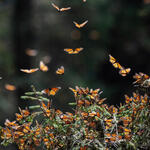- Date: 16 June 2023
Tracking, vaccinating, and returning a black-footed ferret to its burrow in complete darkness is no easy task. But for WWF’s Black-footed Ferret Restoration Manager Kristy Bly, it’s all in a night’s work. For over 20 years, Kristy has teamed up with numerous federal, Tribal, state, and private entities to recover and protect black-footed ferrets.
Black-footed ferrets – one of North America’s most endangered mammals – can only survive within the Great Plains’ prairie dog colonies. Currently there are about 390 ferrets in the wild, but they face mounting danger from habitat loss and sylvatic plague, a non-native disease that affects both ferrets and prairie dogs, their main source of prey. Ferrets not only rely on prairie dogs for food, but also use their burrows for shelter and raising young. Sylvatic plague, a fast-spreading bacterial disease, is threatening both species, making the need for vaccination and protection programs imperative.
Monitoring and protecting ferrets from plague is complex, tedious work. Because ferrets are elusive and nocturnal, scientists use high-intensity spotlights mounted to field trucks and advanced surveillance equipment like thermal cameras to locate them. Much of the field equipment requires battery power from field trucks that must remain noisily idling to charge the equipment, which often disrupts ferret behavior. The vet trailer, where ferrets receive sylvatic plague vaccinations, also runs on propane gas and loud gas-powered generators.
- Date: 13 April 2023
In the lead-up to Earth Day on April 22, WWF is celebrating Monarch Week to call attention to the dramatic decline of the migratory monarch butterfly population. The week-long campaign encourages millions of Americans to help stem the decline of the charismatic species by planting critical milkweed habitat needed along its annual migration route and supporting WWF’s global conservation efforts.
This year WWF is also partnering with world-renowned Chef José Andrés and his Washington, DC-based restaurant Oyamel. From April 17-23, Jose and WWF will be connecting with social media followers and restaurant patrons about the need to save the migratory monarch butterfly. Digital and in-restaurant materials will highlight the plight of the monarch butterfly, WWF’s work to conserve the species, and invite people to take action.
- Date: 03 March 2023
- Author: Giavanna Grein, Lead Specialist, Wildlife
Today we commemorate not only World Wildlife Day, but also the 50th anniversary of CITES, the global treaty regulating the trade in wildlife species. A lot has changed in the last half-century: for example, the original signatories to CITES could never have imagined a future in which tiger cubs appear for sale on social media feeds. This is just one of the many ways in which changing technology has created new challenges for those of us striving to disrupt and ultimately end the illegal wildlife trade.
A simple search of social media sites illustrates the volume of wildlife for sale online, both legal and illegal. In just three seconds, and with only one search term, I was able to find elephant ivory for sale on social media. A jump into one hashtag will reveal available listings for various species and products, such as live reptiles, songbirds, primates, tiger cubs and claws, pangolin scales, rhino horns, and shark fins.
- Date: 03 March 2023
Collaboration is a key ingredient to ensuring a successful outcome for any conservation project. And if you want to deliver big conservation results that improve the health of vital habitats around the world, then choosing and working with trusted partners is a must. On World Wildlife Day, WWF celebrates the many conservation partnerships that contribute to securing a future where people, nature and wildlife thrive.
- Date: 15 April 2022
- Author: Ayse Koçak, TikTok
At TikTok, our mission is to inspire creativity and bring joy. We're proud that over 1 billion people come to our platform each month in search of entertainment and an outlet to share what matters to them. We know that this would not be possible without our community's trust in our ability to maintain a safe and welcoming environment. We believe that everyone should be able to express themselves creatively and be entertained, but not at the expense of other forms of life.
Last year, TikTok joined the Coalition to End Wildlife Trafficking Online, which was established in 2018 by World Wildlife Fund (WWF), TRAFFIC, and IFAW to bring together e-commerce, search, and social platforms across the world to reduce wildlife trafficking online. Since then, we've worked closely with WWF to enhance our policies, launch in-app safety features and tools, and encourage education around the life forms with which we share a planet. In doing so, we aim to continue our work to prevent harmful content and behavior, including wildlife trafficking, from proliferating on the platform.




